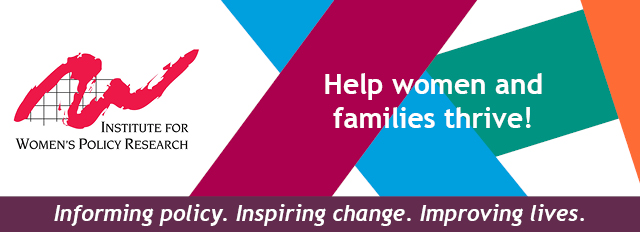
Dear IWPR Supporters and Colleagues,
Today we celebrate Labor Day. As we enjoy the last days of summer, I would like to take a moment to remember the day’s true meaning—a time to honor the contributions workers have made to strengthen the well-being of our country, the struggle for improved pay and working conditions, and the fight that our value be recognized.
As Chair of the Board for the Institute for Women’s Policy Research (IWPR), I’m proud to be a part of this organization and the important role we play in this on-going effort to improve working conditions and economic security for working families. Women play an essential role in the continued strength and prosperity of this country.
Early this summer, IWPR and the National Domestic Workers Alliance (NDWA) released The Status of Black Women in the United States. The report provides critical data to identify the barriers that Black women face in the workplace and to suggest investments, programs, and public policies that can lead to positive changes for Black women and their families. At the June event, “From Persistence to Power: Facts, Truth, & Equality for Women,” IWPR collaborated with Spelman College and the Wellesley Centers for Women to discuss many of the key-findings for the report. You can watch the entire event online. To read the key-findings and for more in-depth information, you can find the full report and the Executive Summary on IWPR’s website.
IWPR’s work to promote equal pay for women is important to ending poverty and improving income security for families. IWPR researchers estimate that it will take until 2059 for women to finally reach equal pay (2056 for White women, 2124 for Black women, and 2248 for Hispanic women). Black women participate in the labor force at higher rates than White, Hispanic, Asian, and Native American women, with 62.2 percent of Black women in the workforce. With the support of unions, Black women earn 32 percent more than their nonunionized counterparts.
Closing the gender wage gap would increase women’s earnings and add billions of dollars in wage and salary income to each state’s economy and $512.6 billion to the national economy. In The Economic Impact of Equal Pay by State, IWPR takes an in-depth look at the best and worst states for women workers. In the briefing paper, The Impact of Equal Pay on Poverty and the Economy, the increasingly important impact of pay equality is examined. Approximately 25.8 million children in the United States would benefit from the increased earnings of their mothers with equal pay.
The value women workers bring to the economy and the positive changes they make to our country inspire IWPR to continue to produce the reliable research that informs and promotes effective policy. At this time in our country, facts have come under attack in many ways and are challenged like never before. The news media rely on IWPR to provide them with the information necessary to tell the stories and struggles of women across the country. With your support, we can continue to fight back against misinformation and allow the media, policymakers, activists, and supporters like you to see the research for themselves.
I encourage you to take a moment today to contemplate the past, present, and future of working women in this country and how to best support their continuing achievements and struggles. As the Chair of the Board of IWPR, I ask for your support. Please make a donation to the Institute today in honor of a hard-working woman in your life.
Lorretta Johnson, Chair, IWPR Board of Directors
Secretary-Treasurer, American Federation of Teachers, AFL-CIO
About the author
- IWPR
- IWPR
- IWPR
- IWPR


